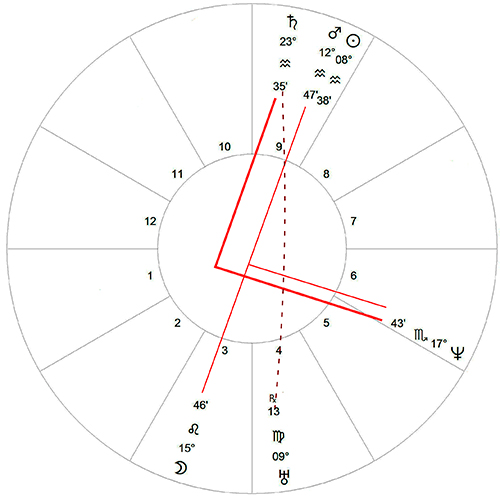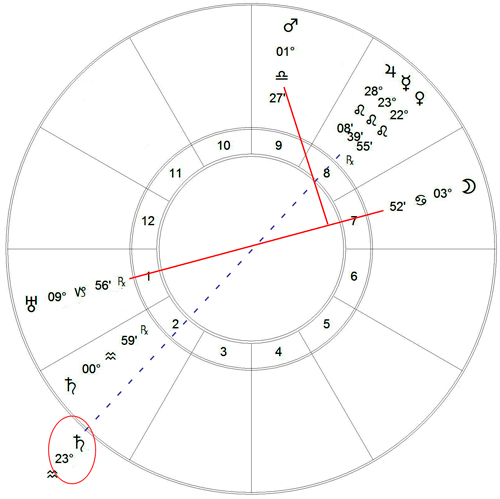
Saturn and the learning process

Like all other planets in astrology, Saturn can be viewed from different angles in different contexts. In the context of the parent-child relationship, the most important symbolic meaning of Saturn is practical learning and cumulative experience.
Client, 30, Vienna
Explore your family horoscope, your children's horoscope or your birth chart to connect the dots.
Book your in-person astrological consultation with Viennese astrologer Tanja Ristovski.
Online consultations are available.
In the endeavour to raise children, parents teach children many things and demonstrate how to cope with the world. What we learn about life directly and indirectly from parents is symbolised in the horoscope by Saturn. Values are of course also part of the process of bringing up children, but values can be preached and values can be lived - Saturn refers to the latter. It refers to what we sometimes experience despite the values that are taught in the family.
This process of learning in the early environment is marked by conscious and unconscious expectations that parents put upon children, by setting certain boundaries and controls - a symbolic domain of Saturn. “Controls” and "boundaries" have some negative implications, such as suppression. But, while they do indicate restrain, controls can also be necessary and constructive: from “don't put fingers in the electric socket” and protecting children from physically dangerous situations, to the discipline and self-regulation necessary for different kind of activities: sports, school studies, social situations etc. Besides controls, Saturn also implicates limiting facts of life. Once when we are aware of limitations, we can initiate constructive and creative processes towards any situation or goal. One comparison: architectural statics, the effect and distribution of forces in the physical world, present the limitations and rules of the factual world, that we need to know in order to build a stable building. That is the essence of learning for life, symbolized by Saturn: it implies learning about limitations, self-regulation and recognising one's own limits, which supports a constructive approach to life - self-protection included.
In this respect, what we learn through childhood experience can either give us constructive patterns of behaviour for dealing with the world, or impose various kinds of (self-)oppression and even create extreme patterns of self-protection (see egoisms in the article about Berlusconi), or it can be a combination of both.
Saturn connections in the natal horoscope
By comparing Saturn in the horoscopes of parents and their children, we can derive insights about parental influences and the children's learning processes. We always consider Saturn in relation to other elements in the horoscope. Because it stays in one sign for about 2 years, any generalisations based only on the sign of Saturn are misleading. The following representation of a family specifically illustrates Saturn's correspondences in the horoscope.
In the natal chart of one mother, Saturn in Aquarius occupies the same sign as the Sun and makes a conjunction with the Midheaven. Saturn rules the 7th house of relationships and makes a quindecile aspect (165°) to Uranus in the 4th house, that rules the Midheaven. Saturn makes a square to Neptune, the co-ruler of the 10th House.
This astrological picture suggests an extremely strong focus on relationships. This focus is linked to how this woman seeks and maintains her place in society, i.e. how she establishes her social position. The needs that motivate her behaviour in terms of relationships are established in her early environment. In other words, she has been influenced and moulded by her parents: by parental example, by parental expectations, by boundaries or by controls imposed during her formative years.

So, how will this woman integrate what she learnt about life and herself in childhood into her adult life? With Saturn in Aquarius in the 9th house, she will tend to intellectualise her experience in relationships, and abstract it into generalised subjective truths about life. Under the influence of Neptune, mode of perceiving will also be idealistic. Saturn's strong configuration to Uranus (quindecile) and the 10th house indicates that idealisation is part of a pattern that protects her sense of individuality - it represents a 'helping hand' in her attempt to develop her own personality and achieve independence (from parents), as well as to establish a position within her social group and society. Relationships become the arena for these efforts, as can be seen from the above astrological constellations.
Parent - Child Horoscope Analysis
Nevertheless, the configurations with Saturn and Neptune indicate a rough path to fulfilment - disappointment, including self-sacrifice, is tied to relationships. Because the experience is so thoroughly intellectualised, her learning could remain in the realm of theory and justification. If we also consider the Moon, which is the ruler of the Ascendant and squares Neptune, we see another emphasis of her seeking emotional security in idealisation, as well as a tendency towards escapism and a blind spots - all focused on relationships.
In other words, there is a high likelihood that these personal challenges will become persistent and will resist resolution. The reality of her life involves multiple unsatisfying partnerships while she is highly focused on searching for the "right relationship" and repeating her patterns of choice and behaviour. So how will this mother pass on her experiences to her children or how will her experiences influence the children? There are no rules for this, only individual horoscopes of the children can provide information.
Saturn dynamics in horoscope comparison
The mother's Saturn falls in the son's 12th house and makes a sextile to his Saturn in Sagittarius in the 9th house. Saturn in the son's chart makes no challenging aspects with other planets, only a trine to the Sun. While the mother's life experiences may provoke anxiety, discomfort or even fear in her son (12th house), he will tend to filter his experiences, including what he has learned directly and indirectly from his mother, through a philosophical rationalisation (9th house and Saturn in Sagittarius). Because the Saturn from the mother's chart makes a sextile with her son's Saturn, her personal problems will not clash with his learning about the world and how to engage in society, nor will his self-protective patterns take any exaggerated form, as his Sagittarius Saturn in the 9th house does not form challenging aspects with other planets. When a Sagittarius-Saturn in the 9th house is challenged by other aspects, the unbalanced self-protective pattern will very probably take the form of extremely dogmatic and biased world view. But that is not the case here.

The daughter's horoscope shows a different picture: Saturn is in the 2nd house, rules the 2nd house and is in the same sign as the mother's Saturn. Saturn in the 2nd house often indicates self-esteem issues, and we see here the connection with the mother's Saturn, which is itself under challenging aspects and also makes an opposition to the three planets in the daughter's chart: retrograde Venus, Mercury and Jupiter in Leo in the 8th house. The mother's experiences and behaviour influence the daughter and her sense of self-worth, as well as her attitude to intimacy in relationships (the 8th house).
Partner Horoscope Analysis - make an appointment
The daughter's chart also shows the Moon in the 7th house making a T-square with Uranus in the 1st house and Mars in the 9th house, with Mars ruling the 4th house, house of emotional security and the early years. This astrological picture indicates that the daughter experienced her early home as insecure and suggests that a deep need was awakened in her to fight for her place at home (Mars). The mother is part of this image through the Moon symbolism. The experience of emotional insecurity in a place that should offer security and protection will influence the daughter's partnerships. The need to fight for safety or to have to defend herself in order to achieve safety will dominate relationships.
Saturn in the 2nd house can develop a focus on material values or social status as a self-protective pattern to compensate for low self-esteem. In the daughter's chart, Saturn shows no challenging constellations but makes a trine to Mars which leads the challenging T-square constellation (Mars-Moon-Uranus). She will most likely be able to learn from her experiences and overcome challenges constructively.
These astrological comparisons demonstrate that although a parent may have his/her own unresolved issues, and may live a life in a state of chronic challenge, the children will not necessarily "inherit" their parents' problems. Analysis of Saturn in family charts gives clear insights into the learning processes that motivate certain patterns of behaviour and the functions these patterns have in an individual's psychological make-up.
You may also find this interesting:
Ukraine and the Uranus - Pluto Square 2014
On Moving in Together with a Partner and Other Relationship Questions
The european crisis and Jupiter-Saturn cycle
Mars in Leo is Mars in Leo. Or is it?
Horary Astrology in Action: Navigating Career, Home, and Business Partnership Decisions
